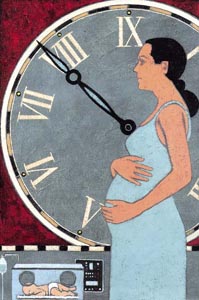
The debate was sparked off by the application that French pharmaceutical firm HRA Pharma' submitted in May to the Korea Food and Drug Administration (KFDA) for license to import the emergency contraceptive Norevo.' Upon receiving this application, the KFDA requested the religious community, doctors, the Ministry of Gender Equality, the Ministry of Health and Welfare, the Youth Protection Committee and the Korea Federation of Family Health and Welfare for their opinions.
The organizations that responded expressed worries that emergency contraceptives may encourage sexual promiscuity among youths and endanger women's health through abuse or misuse. Some groups pointed out that the end result might be a greater burden on women when it comes to birth control. On the other hand, many claim that emergency contraceptives are very much needed to expand women's choices in birth control, given the reality in Korea where abortions outnumber births.
Among the organizations that have submitted their opinions, those against the import of emergency contraceptives say that one of the main reasons is that the product will encourage promiscuity, since pregnancy can now be prevented even after intercourse.
The Christian Council of Korea predicts that the product will create tacit approval of indiscriminate and irresponsible sexual behavior, becoming a bad influence on youths.
The religious community considers fertilization of the ovary as the beginning of life, and thus claims that the emergency contraceptive is not a contraceptive but an abortion pill, since it prevents the fertilized egg from getting implanted in the womb.
The Ministry of Health and Welfare also stated its position, saying, Abuse and misuse of the drug may cause it to become a health hazard rather than a blessing for women. So it is advisable to control its supply, limiting the distributors to certain organizations and the consumers to certain women, such as victims of sexual violence.
However, there are many who think that it is necessary to import emergency contraceptives, because they will broaden the choice of contraceptives for women while reducing the dangers of abortion.
Compared to the annual birth rate of 650 thousand, unofficial statistics put the abortion rate at twice that number.
Jeong Jeong Sun, director of Family Welfare at the Korea Federation of Family Health and Welfare, explains, Abortions carry the danger of infection, bleeding and perforation of the womb, as well as mental hazards such as depression and guilt. Jeong adds, Getting an abortion when young can increase the possibility of infertility, and youths suffer much more mental anguish than adults. Despite all this, the only way out of an unwanted pregnancy currently available to women is abortion.
The Federation reasons, Under the circumstances, emergency contraceptives can help prevent abortions, the common end result of unwanted pregnancies from failed contraception or unprotected sex. They can prevent the increase of unwed mothers and protect women's health. However, the Federation also adds that it is not recommending the emergency contraceptive unconditionally; although it definitely should not be for regular use, it is absolutely necessary for women who need emergency measures.
The Federation suggests that as a precondition to importing this method of birth control, it should be named the emergency contraceptive' and not the morning-after pill,' as the latter implies that the pill can be taken after intercourse anytime. Also, it should be categorized as a specialized drug that can only be dispensed with a doctor's prescription.
Even those in favor of importing emergency contraceptives concede that making the drug available in a situation where women cannot demand men to take charge of contraception may result in women taking on the full responsibility for contraception and ultimately harming their own health through abuse and misuse of the drug. Advocates say that although the drug should be made available as another choice for women, it should be preceded by proper education on contraception and gender equality in sex culture.
HRA Pharma is not the first to ask for license to import emergency contraceptives. Schering Korea made a similar application in 1996 for its brand of emergency contraceptives, Tetraginon.' But Schering decided to cancel the application, explaining that it is too early to start sales in Korea, considering the ethical and social ramifications of the drug.
From 1998 to 2000, the Korea Federation of Family Health and Welfare launched a pilot project to distribute Schering's Tetraginon, provided free of charge by Family Health International.

